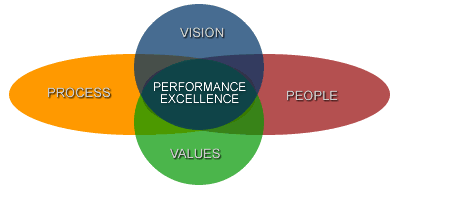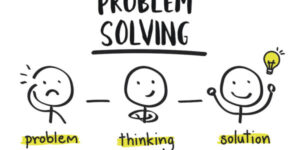While every business has different needs, depending on where they are on their journey, there are some Key Structural Principles & Interpersonal Skills that are displayed by top performers across all sectors. Businesses that operate with a high level of Contribution & Ownership throughout, work Collaboratively and Efficiently and get align behind a Clear Believable Vision regularly come out on top. By getting genuine Employee Engagement without demanding it (the discretionary effort) and staying focused, these businesses rise to the top of their fields. While their business sectors differ, they are all seeking to create a similar Culture and reap the performance improvements that result. So although each coaching engagement will present differently, many of the opportunities exist around the areas of Structure and Interpersonal Skills.
So what are these Structural Principles & Interpersonal Skills?
They centre around the fundamentals of Holding Focus and Building Trust. To assess how relevant they are to your business, here are some questions to help you gauge your business’s proficiencies in these areas.
Consider the questions and then write out your answers. Now ask them of people at different levels and departments within the business. Is everyone clearly aligned with your thinking? Does everyone understand the “big picture” and hold the same ideas about how to deliver it? Is it even discussed or are they too busy executing day to day tasks, to notice or care about the bigger picture?
Structural Principles:
A Clear Believable Vision.
- What’s the grandiose Vision? Where will the Business stand in 8-10 years?
- What are our defined 3-5 year Strategic Goals?
- What are the short-term quarterly Objectives that will deliver these Strategic Goals?
- Does each business area know their aligned Objectives?
- What Key Results will we see en-route that’ll help measure our progress?
- What Tasks are scheduled to make sure it happen? “The Action Plan”.
Holding a Clear Focus:
- Is everyone aware of the Big Picture (Our Grandiose Vision)?
- How often and when do you speak about the Strategic Vision?
- Does everybody understand their Role & Responsibility?
- Are they aware of the Sequencing & Process Flow?
- Do they know the interdependency and subsequence consequences of missing Objectives?
- Is there regular Reviews & Adjustments, and Clear Communication around same?
Interpersonal Skills:
Is it really worth the effort?
- Does everybody understand “the Benefits” of achieving the “Vision”?
- How do they view the Win/Win potential for all?
- The Business wins because …..
- The Leadership wins because …..
- The Client/Customer wins because …..
- The Individual wins because …..
- The Investors win because …..
- Our Partnerships win because …..
- Our Suppliers win because …..
- Encouraging Contribution for Ownership: “No one of us is smarter than all of us”. Do you present Challenges or Solutions? Do you want people to do as directed and then give out when they slack off or lack initiative? If you want your people to contribute and take personal responsibility, then they need to feel valued. “P.R.I.D.E. in Performance” ( ie Personal Responsibility In Delivering Excellence), comes from presenting challenges and inviting contributions to come up with Solutions. When we feel that we’ve contributed to a solution, that ownership creates a sense of responsibility to have it succeed.
So the next time you are challenged, don’t bring the solution, present the Challenge. You can consider it personally beforehand, but remain curious and unattached to your solution. Listen to the ideas, discuss the options and agree collectively the best way forward.
- Explore Difficult People with Curiosity: “Seek 1st to Understand and then to be Understood”. It’s important to uncover the real objections when dealing with people who are presenting as difficult. We all have an innate tendency to look to defend our beliefs. Often we find ourselves searching mentally for further argument or evidence, while the other person is speaking. Our brains become frantic to find further proof to back up our position. The “Yeah, but …..” phrase is a real giveaway. The brain is screaming, “you don’t understand me ….”, and thinking “how can I rephrase it so they’ll understand”, etc. Our “Confirmation Bias” goes into overdrive.
But when you truly listen, reframe their position back to them and ask questions to clarify, you allow them to empty their mind and ready themselves to listen to your perspective. The brain activity quietens down and their inner monologue stops. It says, “Ok, they get where I’m coming from, so what is their argument then?”.
- Understanding how Humans Operate: When we understand the fundamentals of how we operate as humans our communication improves immensely. We stop speaking at people and start to consider alternate perspectives. Curiosity is the key. It furthers Trust & Understanding and helps identify where to focus to succeed (Focus2Succeed ;-). Understanding the areas below provides great insights to improve Teamwork.
- Beliefs > Actions > Results.
- Perspective and our Personal Paradigms.
- How Beliefs are formed.
- Empowering Vs Self Limiting Beliefs.
- Our Beliefs Filing Cabinet.
- Our Conscious Vs Sub-Conscious Mind.
- Selecting and Intentionally Conditioning an Empowering Belief.
- Resistance and “The Saboteur”.
- Operating from the Inside > Out.
Damian Shields is a Performance Coach and the owner of Focus2Succeed. He works with Leaders & Teams to help them “Get their world in Focus & Design their future”. To find out more go to www.Focus2Succeed.ie. You can contact Damian @ Damian.Shields@Focus2Succeed.ie or on 00353 (86) 2512421.




